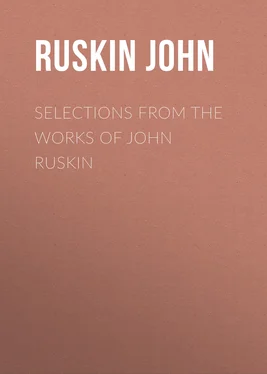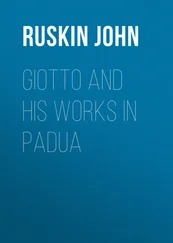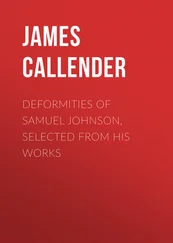John Ruskin - Selections From the Works of John Ruskin
Здесь есть возможность читать онлайн «John Ruskin - Selections From the Works of John Ruskin» — ознакомительный отрывок электронной книги совершенно бесплатно, а после прочтения отрывка купить полную версию. В некоторых случаях можно слушать аудио, скачать через торрент в формате fb2 и присутствует краткое содержание. Жанр: foreign_antique, foreign_home, literature_19, visual_arts, на английском языке. Описание произведения, (предисловие) а так же отзывы посетителей доступны на портале библиотеки ЛибКат.
- Название:Selections From the Works of John Ruskin
- Автор:
- Жанр:
- Год:неизвестен
- ISBN:нет данных
- Рейтинг книги:4 / 5. Голосов: 1
-
Избранное:Добавить в избранное
- Отзывы:
-
Ваша оценка:
- 80
- 1
- 2
- 3
- 4
- 5
Selections From the Works of John Ruskin: краткое содержание, описание и аннотация
Предлагаем к чтению аннотацию, описание, краткое содержание или предисловие (зависит от того, что написал сам автор книги «Selections From the Works of John Ruskin»). Если вы не нашли необходимую информацию о книге — напишите в комментариях, мы постараемся отыскать её.
Selections From the Works of John Ruskin — читать онлайн ознакомительный отрывок
Ниже представлен текст книги, разбитый по страницам. Система сохранения места последней прочитанной страницы, позволяет с удобством читать онлайн бесплатно книгу «Selections From the Works of John Ruskin», без необходимости каждый раз заново искать на чём Вы остановились. Поставьте закладку, и сможете в любой момент перейти на страницу, на которой закончили чтение.
Интервал:
Закладка:
By 1860, he was publishing the papers on political economy, later called Unto this Last , which roused so great a storm of protest when they appeared in the Cornhill Magazine that their publication had to be suspended. The attitude of the public toward such works as these,—its alternate excitement and apathy,—the death of his parents, combined with the distressing events mentioned above, darkened Ruskin's life and spoiled his interest in everything that did not tend to make the national life more thoughtfully solemn.
"It seems to me that now … the thoughts of the true nature of our life, and of its powers and responsibilities should present themselves with absolute sadness and sternness." 4 4 The Mystery of Life.
His lectures as Slade Professor of Art at Oxford, a post which he held at various times from 1870 to 1883, failed to re-establish his undistracted interest in things beautiful.
The complete triumph of the reformer over the art-critic is marked by Fors Clavigera , a series of letters to workingmen, begun New Year's Day, 1871, in which it was proposed to establish a model colony of peasants, whose lives should be made simple, honest, happy, and even cultured, by a return to more primitive methods of tilling the soil and of making useful and beautiful objects. The Guild of St. George, established to "slay the dragon of industrialism," to dispose of machinery, slums, and discontent, consumed a large part of Ruskin's time and money. He had inherited a fortune of approximately a million dollars, and he now began to dispose of it in various charitable schemes,—establishing tea-shops, supporting young painters, planning model tenements, but, above all, in elaborating his ideas for the Guild. The result of it all—whatever particular reforms were effected or manual industries established—was, to Ruskin's view, failure, and his mind, weakening under the strain of its profound disappointments, at last crashed in ruin.
It is needless to follow the broken author through the desolation of his closing years to his death in 1900. Save for his charming reminiscences, Præterita , his work was done; the long struggle was over, the struggle of one man to reduce the complexities of a national life to an apostolic simplicity, to make it beautiful and good,
Till the high God behold it from beyond,
And enter it.
II
THE UNITY OF RUSKIN'S WRITINGS
Ruskin is often described as an author of bewildering variety, whose mind drifted waywardly from topic to topic—from painting to political economy, from architecture to agriculture—with a license as illogical as it was indiscriminating. To this impression, Ruskin himself sometimes gave currency. He was, for illustration, once announced to lecture on crystallography, but, as we are informed by one present, 5 5 See Harrison's Life , p. 111. Cf. the opening of The Mystery of Life .
he opened by asserting that he was really about to lecture on Cistercian architecture; nor did it greatly matter what the title was; "for," said he, "if I had begun to speak about Cistercian abbeys, I should have been sure to get on crystals presently; and if I had begun upon crystals, I should soon have drifted into architecture." Those who conceive of Ruskin as being thus a kind of literary Proteus like to point to the year 1860, that of the publication of his tracts on economics, as witnessing the greatest and suddenest of his changes, that from reforming art to reforming society; and it is true that this year affords a simple dividing-line between Ruskin's earlier work, which is sufficiently described by the three titles, Modern Painters, The Seven Lamps of Architecture , and The Stones of Venice , and his later work, chiefly on social subjects such as are discussed in Unto This Last, The Crown of Wild Olive , and Fors Clavigera . And yet we cannot insist too often on the essential unity of this work, for, viewed in the large, it betrays one continuous development. The seeds of Fors are in The Stones of Venice .
The governing idea of Ruskin's first published work, Modern Painters, Volume I , was a moral idea. The book was dedicated to the principle that that art is greatest which deals with the greatest number of greatest ideas,—those, we learn presently, which reveal divine truth; the office of the painter, we are told, 6 6 Part 2, sec. 1, chap. 4.
is the same as that of the preacher, for "the duty of both is to take for each discourse one essential truth." As if recalling this argument that the painter is a preacher, Carlyle described The Stones of Venice as a "sermon in stones." In the idea that all art, when we have taken due account of technique and training, springs from a moral character, we find the unifying principle of Ruskin's strangely diversified work. The very title The Seven Lamps of Architecture , with its chapters headed "Sacrifice," "Obedience," etc., is a sufficient illustration of Ruskin's identification of moral principles with aesthetic principles. A glance at the following pages of this book will show how Ruskin is for ever halting himself to demand the moral significance of some fair landscape, gorgeous painting, heaven-aspiring cathedral. In "Mountain Glory," for example, he refers to the mountains as "kindly in simple lessons to the workman," and inquires later at what times mankind has offered worship in these mountain churches; of the English cathedral he says, "Weigh the influence of those dark towers on all who have passed through the lonely square at their feet for centuries"; 7 7 See p. 159.
of St. Mark's, "And what effect has this splendour on those who pass beneath it?"—and it will be noticed on referring to "The Two Boyhoods," that, in seeking to define the difference between Giorgione and Turner, the author instinctively has recourse to distinguishing the religious influences exerted on the two in youth.
Now it is clear that a student of the relation of art to life, of work to the character of the workman and of his nation, may, and in fact inevitably must, be led in time to attend to the producer rather than to the product, to the cause rather than to the effect; and if we grant, with Ruskin, that the sources of art, namely, the national life, are denied, it will obviously be the part, not only of humanity but of common sense, for such a student to set about purifying the social life of the nation. Whether the reformation proposed by Ruskin be the proper method of attack is not the question we are here concerned with; our only object at present being to call attention to the fact that such a lecture as that on "Traffic" in The Crown of Wild Olive is the logical outgrowth of such a chapter as "Ideas of Beauty" in the first volume of Modern Painters . Between the author who wrote in 1842, of the necessity of revealing new truths in painting, "This, if it be an honest work of art, it must have done, for no man ever yet worked honestly without giving some such help to his race. God appoints to every one of his creatures a separate mission, and if they discharge it honourably … there will assuredly come of it such burning as, in its appointed mode and measure, shall shine before men, and be of service constant and holy," 8 8 Modern Painters , vol. 1, part 2, sec. 1, chap. 7.
and the author who wrote, "That country is the richest which nourishes the greatest number of noble and happy human beings," 9 9 Unto This Last .
or, "The beginning of art is in getting our country clean, and our people beautiful," 10 10 See p. 262.
—between these two, I say, there is no essential difference. They are not contradictory but consistent.
Интервал:
Закладка:
Похожие книги на «Selections From the Works of John Ruskin»
Представляем Вашему вниманию похожие книги на «Selections From the Works of John Ruskin» списком для выбора. Мы отобрали схожую по названию и смыслу литературу в надежде предоставить читателям больше вариантов отыскать новые, интересные, ещё непрочитанные произведения.
Обсуждение, отзывы о книге «Selections From the Works of John Ruskin» и просто собственные мнения читателей. Оставьте ваши комментарии, напишите, что Вы думаете о произведении, его смысле или главных героях. Укажите что конкретно понравилось, а что нет, и почему Вы так считаете.












